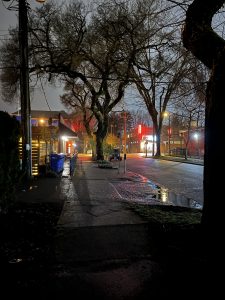“Amulet” by Roberto Bolano
by jenna loupret
The novel, “Amulet” by Roberto Bolano was an enjoyable read. It features Auxilio Lacouture who is an uruguay immigrant living illegally in Mexico City. She is passionate about poetry and literature which leads her to having many different relationships with different famous Mexican writers, as well as working odd jobs at the National Autonomous University of Mexico. While working at the UNAM, Auxilio became the only symbolic resistor of the Tlatelolco massacre in 1968. The novel tells the story of Auxilio and her life before, during and after the event and how she influenced and nurtured Mexican poetry and literature.

I took this photo the other night when I was walking home from my friends house, I really like it because of the way the stop lights and store lights cast shadows.
Overall, the timeline of this novel is confusing, but I find that there is a purpose to it. Auxilio is a classic example of an unreliable narrator. She starts the story unsure of when exactly she moved to Mexico and continues to confuse dates and years in which events took place. As well, she narrates the story as if she’s telling it while being held captive in the bathroom but much of the story takes place after the events of the massacre. On page 56, she says “that afternoon of 1971 or 1972. And the strangest thing is I remember it prospectively, from 1968”, this conflated timeline leaves the reader unsure of what events are true and what exactly is happening in the “present” (1968). Furthermore, Auxilio says that everyone believes the things she says because she is “their mother” and because she can see into the past and into the future. This omniscient point of view from the narrator, who is also a character in her own story is an interesting perspective, but also confusing. I think that this narrative structure is supposed to clearly distinguish her life before the massacre and after. The massacre acts as a grounding point in which afterwards Auxilio is never the same.
On the very first page, Axilio refers to herself as “the mother of Mexican poetry”, at first I interpreted that to mean she founded Mexican poetry. However, after reading the book I interpret it differently now. She nurtured and guided Mexican poetry. She loved poetry and literature so much that she nurtured it by taking care of the professors and students at the university and the renowned poets of Mexico City. She wasn’t a writer herself but she contributed a lot to the culture of poetry and literature.
As the book goes on Auxilio seems to lose track of the narrative and it is slowly transformed into something fantastical. This aspect of the novel was very confusing, although I don’t fully think I grasped the entire concept of the novel, I’m curious as to how everyone else viewed the unravelling of the narrative. Therefore, my question is; how do you think the unravelling of the narrative contributed to the novel as a whole?
I always love your photos, by the way!
As for what you have to say about Lacouture as an “unreliable narrator”: that’s absolutely true. Yet at the same time, she presents herself as somebody in whom others can trust, perhaps on some different level. She is there for the young poets, she is there for the Mexican students, she is there for the Latin American youth. We may not be able to trust her vision of things, but we are told we can trust her… even absolutely, perhaps.